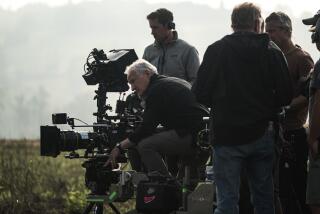Crockett and Tubbs: The makeover
- Share via
WHAT happened to the pastel hues, the Armani suits, the sockless shoes? What about the propulsive, tropical theme music of Jan Hammer, and even the alligator?
Michael Mann’s “Miami Vice,” which opens today, borrows its title and buddy-cops-in-Miami premise from one of the most universally recognized TV shows yet leaves out many of the elements that helped make the 1980s TV series a hit.
Which poses the question: If you take the “Miami Vice” out of “Miami Vice,” will the masses want to see it?
Tracking polls -- that sometimes inexact Hollywood science in which likely moviegoers are surveyed -- are mixed on the new crime thriller. One recent poll found that only 25% of moviegoers expressed a “definite interest” in seeing the film, while a scant 4% described it as their “first choice.” But another poll found 17% of moviegoers listing it as their “first choice” and a much higher percentage of moviegoers in their 20s expressing “definite interest” -- 50% of males and 35% of females.
The next few days may determine whether writer-director Michael Mann and executives at Universal Pictures guessed right when they decided to dispense with the show’s signature stylings, and even its humor.
Hammer, for one, says the decision to turn “Miami Vice” into a brooding, gritty drama -- not unlike the director’s previous film, “Collateral” -- may have missed the boat.
The composer is still chafing that Mann didn’t find room in the movie for the TV show’s popular theme, which hit No. 1 on the charts in 1985. The director, instead, turned to rapper Jay-Z for the soundtrack.
There’s plenty to suggest that there’s a nostalgic audience looking to revisit the ‘80s, says Hammer. His new album, “The Best of Miami Vice,” has already climbed into the Top 40 adult contemporary charts.
“By all means, get anybody you want [to score the film]. But I was shocked that there was no attempt made [to include] the most iconic part of the music,” Hammer said. He also added: “Michael is a great, great auteur .... The one thing Michael never wants to be is cheesy. More power to him. He’s great, but the film maybe should have been called ‘Collateral.’ ”
Hammer pointed out that the show and the music are so intertwined that when Jamie Foxx and Colin Farrell appear on a talk show to promote their film, they are greeted with the TV theme music. “It’s so preposterous, the whole situation,” Hammer said of the decision to take the movie in a completely different direction. “It’s a pity.”
Turning TV hits into movies has been a bit of a gamble. Some, such as “Mission: Impossible,” can turn into blockbusters. Others, such as last year’s “Bewitched,” can fall short.
But one thing is certain: Universal has plenty at stake on this movie.
With a production budget soaring to $135 million (rumors persist that the actual figure is much higher), and $40 million earmarked for prints and advertising, industry insiders estimate that “Miami Vice” will have to open with at least $30 million domestically if it is ever to reach the $100-million mark that defines a blockbuster.
Universal is cautiously optimistic. They point to Mann’s previous film “Collateral,” whose tracking was similar to that of “Miami Vice” in the days before it opened -- to about $25 million -- and went on to gross $101 million in North America. While “Collateral” had the drawing power of Tom Cruise, Universal’s president of marketing, Adam Fogelson, said the studio is counting on the brand name of “Miami Vice” and fans of Mann’s previous films to generate interest.
Mann, an Oscar-nominated director whose previous films include “The Last of the Mohicans” and “Heat,” has said all along that he didn’t want to do a mirror remake of the “Miami Vice” TV series, for which he was executive producer.
But Mann and the studio had no illusions that the film wouldn’t be compared to the hit series.
Marc Shmuger, chairman of Universal Pictures, was on the “greenlight” committee that gave the go-ahead to make the film when Stacey Snider, who is now at DreamWorks, was Universal’s studio chief. He noted that Mann had to convince them that he could pull it off and that he needed a huge budget to do so.
“ ‘Miami Vice’ is a hyper-intense, hyper-real ... look at the most seamy underbelly of crime,” Shmuger said. “It ain’t your grandfather’s ‘Miami Vice.’ In order to do it right, to show that world and bring it alive with total authenticity, you have to do it in an R-rated fashion. Those were the initial discussions we all had.
“The R rating and costs gave us pause,” he continued. “There was healthy, vigorous debate at the time. ‘Miami Vice’ is a title that comes with a lot of prior association for all of us. I was originally concerned about what it would be like to turn that series into a movie. Would it be cheesy? Is it still relevant? Would a youth audience feel it wasn’t cool enough for them? What convinced all of us was Michael’s script and vision. Everyone in the green-light process agreed in the end.”
Around Hollywood, though, opinions vary as to whether “Miami Vice” was a remake worth the effort.
“To me, ‘Miami Vice,’ despite Michael Mann’s extraordinary talent -- and those are two interesting actors to be sure -- seems to be like an overblown genre film,” said entertainment attorney Stan Coleman, who has worked on movies that were derived from television series and also on “branding” issues in the entertainment industry. “And to do it at that price seems very risky.... The [TV] history goes back so far that moviegoers have no recollection of it. It has no value as a pre-sold movie.”
Coleman noted that the TV series was very much a species of its time and place. “That is one of the reasons it was so successful,” he said. “It did such a spectacular job of establishing that moment and space in our culture. ... What do you do with a period piece whose value was in the period?” He said the situation underscored the challenge facing remakes, as opposed to sequels. “The idea of ‘Pirates of the Caribbean’ is to keep pumping them out before people go on to something else. ‘Miami Vice’ means nothing.”
But Tom Sherak, a partner at Revolution Studios who once headed distribution at 20th Century Fox, disagrees.
“Periods of time change, and I don’t know if you’d want to make it exactly like the TV stuff.... Older audiences will likely want to see the movie because it is something they grew up with while younger audiences want something fresh, hip and different -- they don’t care if it was on TV 20 years ago.”
Questions have also been raised about casting Farrell and Foxx in the leads. Both are popular. And people know that Foxx can act -- he who won the Oscar for his leading role in the 2004 Academy Award-nominated biopic “Ray.” But neither has proved they can open a movie on the strengths of their names the way Cruise or Adam Sandler can.
“Jamie Foxx has been relatively unproven since ‘Ray,’ ” said Box Office Mojo’s Brandon Gray. “He’s had ‘Stealth’ and ‘Jarhead,’ both supporting roles even though he was promoted as the lead in the marketing. ‘Miami Vice’ is his first leading role since ‘Ray.’ ”
As for Farrell, he starred in Oliver Stone’s misfiring historical drama “Alexander,” which grossed $34.3 million domestically. He also starred in Terrence Malick’s critically acclaimed period piece, “The New World,” but the film grossed a mere $12.7 million. One has to go back three years to the cop thriller “S.W.A.T.” to find Farrell’s last undisputed hit. It opened with $37 million and went on to gross $117 million in North America.
“Colin Farrell was a rising star as of 2003, but then he did these smaller pictures and these high-profile period pieces that failed,” Gray said.
While it is too soon to predict how the film will do at the box office, some say the movie’s release date could help give it a boost. Sherak noted that “Miami Vice” won’t be competing against films of a similar genre this weekend and that’s because, to rival studios, a Michael Mann film starring Farrell and Foxx looks formidable on paper.
“Everybody stayed away from it because the guys in the industry thought it would be a big movie,” Sherak said.
More to Read
Only good movies
Get the Indie Focus newsletter, Mark Olsen's weekly guide to the world of cinema.
You may occasionally receive promotional content from the Los Angeles Times.










